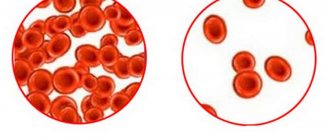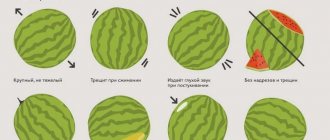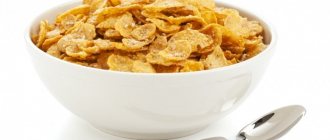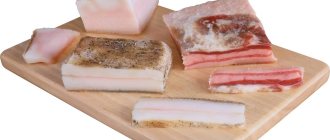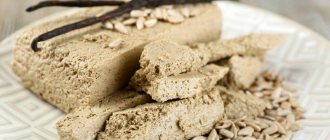VK
Buffer
Postpartum weakness, frequent dizziness and breastfeeding - how to restore your strength? Usual preparations with iron, beet and carrot juices, pomegranate seeds - all this must be excluded from the woman’s diet in the first months of the baby’s life. Is it possible for a nursing mother to use hematogen to increase the level of hemoglobin in the blood? Let's figure it out further.
Useful properties of hematogen
The Hematogen sweet bar contains a large amount of albumin protein, which is obtained from bovine blood. The amino acids included in its composition are easily absorbed by the digestive system. In addition, albumin is rich in iron and vitamins, which are necessary for the full functioning of the body.
- Due to its high iron content, hematogen helps increase hemoglobin levels in the blood. For this reason, the bar is recommended to be included in the diet of people suffering from anemia (this disease is caused by iron deficiency).
- Due to the high content of vitamins, hematogen has a general strengthening effect, improves the functioning of the immune system, and helps the body resist various infections.
- The dietary supplement contains a large amount of vitamin A, which affects the quality of vision, the condition of the skin, hair and nails.
- The use of hematogen has a positive effect on the functioning of the kidneys, liver, and gall bladder.
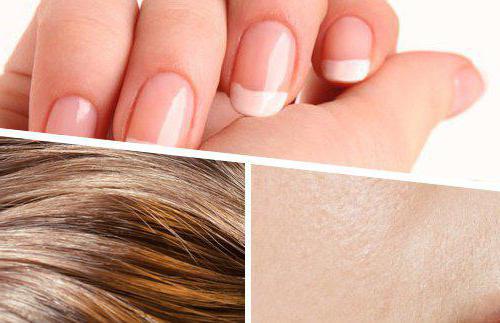
The use of hematogen has a positive effect on the condition of the skin, hair and nails
Composition and benefits of hematogen
The taste of hematogen is familiar to everyone from early childhood. The drug, which is based on dried cattle blood, is known in different parts of the world. The product, first released for sale in the second half of the 19th century in Switzerland, is distinguished by a wide range of beneficial properties. Russians learned about the valuable candy bar after the revolution, at the beginning of the 20th century. The name of the natural product is translated from Greek as “giving birth to blood.” The composition of hematogen according to GOST includes:
- black food albumin - its maximum concentration is 5% per 100 grams;
- milk condensed with granulated sugar – up to 33%;
- starch syrup – up to 23%;
- vanillin – up to 0.015%;
- granulated sugar.
To improve the taste, various additives are introduced - hazelnuts, honey, chocolate, sesame seeds, candied fruits, coconut flakes.
The product, rich in iron, vitamins, and amino acids, has a number of beneficial properties:
- increases hemoglobin levels in iron deficiency anemia;
- normalizes weight and height in children;
- supports the full functioning of all human organs;
- improves the process of blood production;
- prevents the development of anemia;
- eliminates swelling;
- improves vision, condition of nails, hair;
- stabilizes metabolism and the functioning of the digestive system;
- helps cope with heavy physical activity.
The drug is often prescribed for the postoperative period to restore strength and generally improve the functioning of the body. The drug is indispensable for duodenal disease, stomach ulcers, and any diseases and injuries associated with blood loss. The bars can be safely fed to children from the age of three years.
Features of use during breastfeeding
The beneficial properties of hematogen are, of course, especially relevant for the body of a nursing mother, weakened by recent childbirth. However, experts do not recommend that a woman include a sweet bar in her diet until the baby is three months old.
First, the mother tries a small piece and carefully monitors the child’s condition for two days (this is especially important if the baby has previously had allergic reactions). In the absence of negative consequences, the daily portion can be doubled (but no more).
The optimal solution is to consult with a therapist about the permissible daily dose of hematogen used.
A woman should be prepared that hematogen can change the taste of breast milk, and the baby will refuse to feed. In this case, it is necessary to reduce the amount of treats consumed or completely abandon them.
In addition, a nursing mother should choose only the bar that is sold in the pharmacy. It is important that this is a traditional version, without various additives. Indeed, to improve the taste of the product, manufacturers often include honey, cocoa, condensed milk, molasses, dried fruits, nuts, and a variety of flavorings. Although their concentration is small, most of these components are potential allergens.
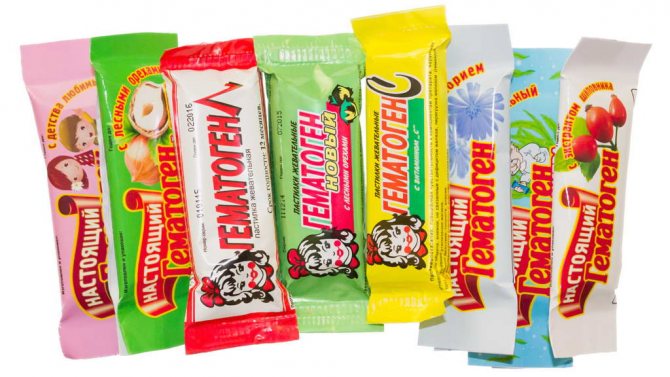
Today in pharmacies and on store shelves there are bars with a variety of additives that can provoke allergies in mother and baby.
If a nursing mother has a low hemoglobin level, then she needs to take iron-containing medications. The problem cannot be eliminated by consuming hematogen alone, especially since only small portions of sweet treats are allowed during breastfeeding.
Contraindications
This seemingly harmless product has several contraindications. Hematogen should not be eaten by women after childbirth if:
- there is an intolerance to the components that make up this product;
- the child refuses to eat breast milk.
If a nursing mother does not have the above problems, she can eat her favorite treat in small quantities. It's better to buy it at a pharmacy. Preference should be given to children's hematogen without any additives. Before using it, you should consult a doctor.
Thus, despite the beneficial properties of hematogen, it should be eaten with caution when breastfeeding. It has a number of contraindications and side effects that nursing mothers should not forget about, so as not to harm themselves and their baby.
Is hematogen beneficial or harmful during breastfeeding? This issue must be addressed before you start using the product. To date, there is no consensus on its inclusion in the diet. Nutritionists allow nursing mothers to eat it only in limited quantities. However, not everyone should do this. This is why we recommend consulting a breastfeeding specialist.
Compatibility with other products and drugs
Hematogen is a useful product, but when consuming it, a nursing mother must follow certain rules.
- If a woman additionally takes a vitamin complex, then this should be done only two hours after consuming the hematogen.
- The bar should not be combined with taking most antibiotics. When prescribing medications, you need to clarify this issue with your doctor. Also, hematogen should not be taken simultaneously with painkillers and drugs to support cardiac activity.
- If you combine the use of hematogen with calcium and antibiotics, the medications will interfere with the normal absorption of iron.
- There is no need to eat fish and liver at the same time as hematogen. In this case, the treat is eaten one hour before the main meal or two hours later. This will allow iron to be absorbed normally in the body.
- If a nursing mother adheres to a low-salt diet, then she should take Hematogen with caution.

Hematogen is not consumed together with vitamins, and if a nursing mother is taking antibiotics or calcium-containing medications, then the sweet bar should be completely abandoned for a while
Side effects
Any biological supplements can have side effects, especially if used incorrectly. Side effects of hematogen are: constipation, heartburn, unpleasant taste in the mouth, vomiting, headache, allergic reaction.
This product must be introduced into the diet of a nursing mother gradually, carefully observing the baby’s reaction, so as not to harm yourself and the baby.
Each mother is responsible for her own choice of food, and, trying to diversify her taste sensations, you should not get carried away by eating a lot of what seems healthy. There should be moderation in everything, especially in the use of those products that are dietary supplements! Be healthy!
It is known that the content of beneficial elements in breast milk directly depends on what the nursing mother eats. If she does everything correctly, and the diet is filled with all the necessary beneficial elements, vitamins, minerals, fiber, this means that the baby, through breast milk, can receive all the beneficial elements he needs for proper growth, rapid development, and also to strengthen the immune system.
Contraindications and possible adverse reactions when using hematogen
Sometimes even the healthiest foods cannot be consumed due to the individual characteristics of the body. Thus, albumin molecules (and this is still a protein foreign to humans) when they enter a woman’s blood from the intestines in an undigested form can provoke an allergy in her. A similar reaction can occur in a child.
Of course, as research from the Institute of Nutrition proves, the likelihood of incomplete breakdown of albumin from bovine blood is lower than that of cow's milk protein or chicken eggs. But such a possibility is still not excluded. A nursing woman should keep in mind that if her baby develops allergy symptoms after drinking cow's milk, they may also appear after drinking hematogen.
Since the sweet bar is very high in calories, it should not be eaten by women who are obese or prone to rapid weight gain. In addition, the presence of sucrose in the product makes it contraindicated for use by patients with diabetes.
If a nursing mother suffers from anemia and has any of the indicated contraindications to the use of hematogen, then she should replace it with other animal products containing a lot of iron (for example, eat more meat and liver). This will be an additional measure along with the use of iron-containing medications.
In addition, a nursing mother should know that the unreasonable use of hematogen (in large quantities or simultaneously with certain drugs and products) can cause her unwanted side effects, which will not have the best effect on the child’s condition:
- problems in the digestive tract: stomach pain, heartburn, nausea, constipation, diarrhea, unpleasant taste in the mouth;
- headache;
- sore throat when swallowing;
- allergic skin reaction, redness, urticaria.

Excessive consumption of hematogen can cause headaches in a nursing mother
Why can't Hematogen be given to nursing mothers?
A completely safe, at first glance, pharmaceutical product can provoke a number of undesirable consequences. Especially if you consume it in large quantities. It should be borne in mind that the product contains a large amount of bovine blood (even processed).
This substance consists of a protein, which is a strong allergen. Therefore, in order to understand whether hematogen is possible during breastfeeding, it is necessary to find out about the mother’s predisposition to allergic reactions and the presence of hypersensitivity to albumin. Only a specialist can help with this.
Food allergies can occur in a baby. Diathesis, redness and peeling of the skin are the first signs that the baby’s body is not yet ready for such experiments.
This pharmaceutical drug seems to us to be simply a healthy and tasty treat, so many mothers believe that during lactation it will not harm either them or their babies. But is it? Is hematogen allowed during breastfeeding?
Doctor Komarovsky's opinion on hematogen
Dr. Komarovsky considers hematogen a useful product because it contains iron of animal origin (“hemic”). The pediatrician explains that today there are many varieties of the bar: some do not contain iron at all, while others add it additionally.
Evgeniy Olegovich warns women that this product should not be considered a medicine. This is simply a good nutritional supplement (among other things, it can quickly saturate a depleted body with proteins, fats and carbohydrates).
The doctor warns that if a woman has a tendency to gain excess weight, then she should not get carried away with hematogen.
